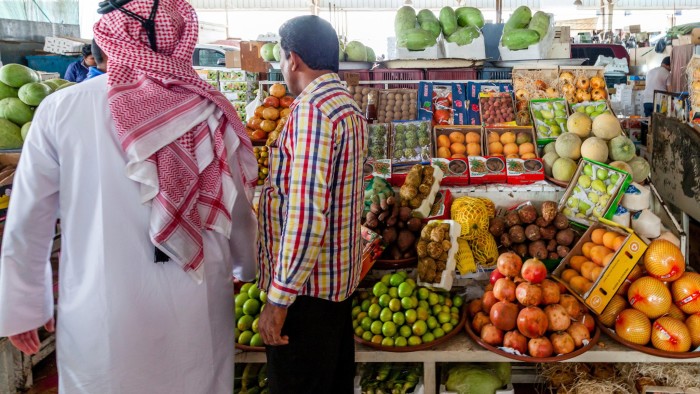Qatar bans imports from four Arab neighbours

Roula Khalaf, Editor of the FT, selects her favourite stories in this weekly newsletter.
Qatar has banned products imported from the four Arab neighbours that a year ago imposed a regional embargo on the gas-rich state, in a retaliatory move against its rivals.
A circular issued by the economy ministry ordered stores to stop selling all products imported from Saudi Arabia, the United Arab Emirates, Bahrain and Egypt.
A government statement on Saturday said the ban was “to protect the safety of consumers in the state of Qatar and to combat improper trafficking of goods”.
Last June, the Arab quartet imposed a trade and travel embargo on Qatar, closing off airspace and ports to Qatari-bound goods and passengers, as it accused Doha of sponsoring terrorism.
Qatar’s imports plummeted by 40 per cent in the first weeks of the boycott and placed pressure on the long-haul airline Qatar Airways, which had extensive operations in the four states. While imports from the quartet have fallen dramatically, the government had to date turned a blind eye to goods arriving from the four nations that imposed the embargo via third states.
The hardening of Qatar’s position reflects the widening chasm across the Gulf, dividing US allies as Washington seeks to build a stronger regional alliance against Iran and Islamist extremism. Qatar is the headquarters of the US military’s regional operations.
The quartet has rebuffed recent US attempts to defuse tensions and bring its feuding Gulf allies around the negotiating table.
Doha, which denies accusations of supporting extremism, has managed to sustain the flow of goods by tapping strategic stocks and opening up new shipping routes from its recently opened Hamad port. Qatar is pushing ahead with a $200bn infrastructure investment plan as it prepares to host the 2022 Fifa World Cup.
The government has also encouraged local production of vegetables, dairy and other staples. Investors are also looking to manufacture other basic items, such as pharmaceuticals, to protect the economy from outside shocks.
Many goods, from electronics to fabric, used to be shipped to Doha on multiple daily routes into Qatar from the regional re-export hub at Dubai’s Jebel Ali port. Building materials mostly travelled across the Saudi land border.
Neutral Gulf neighbours Oman and Kuwait have increased trade relations with Qatar, while the quartet’s regional rival Iran has also assisted in sustaining supplies.
Imports from Saudi Arabia and the UAE have collapsed since the embargo was launched, but traders are still importing goods from Dubai to Qatar via Oman and other third-party states.
UAE imports have fallen from QR2.6bn in the first quarter of last year to QR188m in the first quarter of 2018, according to official statistics.
Saudi imports have fallen from QR1.2bn ($714m) to QR45m over the same timeframe. Iranian imports have risen from QR33m to QR216m.
As the government seeks to boost investment, Qatar has opened the country’s entire real estate sector to overseas buyers and last week said it would allow foreigners to own companies fully, rather than having to hold a minority stake with a local partner.
Comments